C++17 - The Complete Guide
Contents
Preface
About This Book
What You Should Know Before Reading This Book
Overall Structure of the Book
How to Read This Book
The C++17 Standard
Example Code and Additional Information
Feedback
Part I: Basic Language Features
1 Structured Bindings
1.1 Structured Bindings in Detail
1.2 Where Structured Bindings can be Used
1.2.1 Structures and Classes
1.2.2 Raw Arrays
1.2.3 std::pair, std::tuple, and std::array
1.3 Providing a Tuple-Like API for Structured Bindings
1.4 Afternotes
2 if and switch with Initialization
2.1 if with Initialization
2.2 switch with Initialization
2.3 Afternotes
3 Inline Variables
3.1 Motivation of Inline Variables
3.2 Using Inline Variables
3.3 constexpr now implies inline
3.4 Inline Variables and thread_local
3.5 Afternotes
4 Aggregate Extensions
4.1 Motivation for Extended Aggregate Initialization
4.2 Using Extended Aggregate Initialization
4.3 Definition of Aggregates
4.4 Backward Incompatibilities
4.5 Afternotes
5 Mandatory Copy Elision or Passing Unmaterialized Objects
5.1 Motivation for Mandatory Copy Elision for Temporaries
5.2 Benefit of Mandatory Copy Elision for Temporaries
5.3 Clarified Value Categories
5.3.1 Value Categories
5.3.2 Value Categories Since C++17
5.4 Unmaterialized Return Value Passing
5.5 Afternotes
6 Lambda Extensions
6.1 constexpr Lambdas
6.2 Passing Copies of this to Lambdas
6.3 Capturing by Reference
6.4 Afternotes
7 New Attributes and Attribute Features
7.1 Attribute [[nodiscard]]
7.2 Attribute [[maybe_unused]]
7.3 Attribute [[fallthrough]]
7.4 General Attribute Extensions
7.5 Afternotes
8 Other Language Features
8.1 Nested Namespaces
8.2 Defined Expression Evaluation Order
8.3 Relaxed Enum Initialization from Integral Values
8.4 Fixed Direct List Initialization with auto
8.5 Hexadecimal Floating-Point Literals
8.6 UTF-8 Character Literals
8.7 Exception Specifications as Part of the Type
8.8 Single-Argument static_assert
8.9 Preprocessor Condition __has_include
8.10 Afternotes
Part II: Template Features
9 Class Template Argument Deduction
9.1 Usage of Class Template Argument Deduction
9.1.1 Copying by Default
9.1.2 Deducing the Type of Lambdas
9.1.3 No Partial Class Template Argument Deduction
9.1.4 Class Template Argument Deduction Instead of Convenience Functions
9.2 Deduction Guides
9.2.1 Using Deduction Guides to Force Decay
9.2.2 Non-Template Deduction Guides
9.2.3 Deduction Guides versus Constructors
9.2.4 Explicit Deduction Guides
9.2.5 Deduction Guides for Aggregates
9.2.6 Standard Deduction Guides
9.3 Afternotes
10 Compile-Time if
10.1 Motivation for Compile-Time if
10.2 Using Compile-Time if
10.2.1 Caveats for Compile-Time if
10.2.2 Other Compile-Time if Examples
10.3 Compile-Time if with Initialization
10.4 Using Compile-Time if Outside Templates
10.5 Afternotes
11 Fold Expressions
11.1 Motivation for Fold Expressions
11.2 Using Fold Expressions
11.2.1 Dealing with Empty Parameter Packs
11.2.2 Supported Operators
11.2.3 Using Fold Expressions for Types
11.3 Afternotes
12 Dealing with Strings as Template Parameters
12.1 Using Strings in Templates
12.2 Afternotes
13 Placeholder Types like auto as Template Parameters
13.1 Using auto as Template Parameter
13.1.1 Parameterizing Templates for Characters and Strings
13.1.2 Defining Metaprogramming Constants
13.2 Using auto as Variable Template Parameter
13.3 Using decltype(auto) as Template Parameter
13.4 Afternotes
14 Extended Using Declarations
14.1 Using Variadic Using Declarations
14.2 Variadic Using Declarations for Inheriting Constructors
14.3 Afternotes
Part III: New Library Components
15 std::optional<>
15.1 Using std::optional<>
15.1.1 Optional Return Values
15.1.2 Optional Arguments and Data Members
15.2 std::optional<> Types and Operations
15.2.1 std::optional<> Types
15.2.2 std::optional<> Operations
15.3 Special Cases
15.3.1 Optional of Boolean or Raw Pointer Values
15.3.2 Optional of Optional
15.4 Afternotes
16 std::variant<>
16.1 Motivation of std::variant<>
16.2 Using std::variant<>
16.3 std::variant<> Types and Operations
16.3.1 std::variant<> Types
16.3.2 std::variant<> Operations
16.3.3 Visitors
16.3.4 Valueless by Exception
16.4 Polymorphism and Inhomogeneous Collections with std::variant
16.4.1 Geometric Objects with std::variant
16.4.2 Other Inhomogeneous Collections with std::variant
16.4.3 Comparing variant Polymorphism
16.5 Special Cases with std::variant<>
16.5.1 Having Both bool and std::string Alternatives
16.6 Afternotes
17 std::any
17.1 Using std::any
17.2 std::any Types and Operations
17.2.1 Any Types
17.2.2 Any Operations
17.3 Afternotes
18 std::byte
18.1 Using std::byte
18.2 std::byte Types and Operations
18.2.1 std::byte Types
18.2.2 std::byte Operations
18.3 Afternotes
19 String Views
19.1 Differences to std::string
19.2 Using String Views
19.3 Using String Views Similar to Strings
19.3.1 String View Considered Harmful
19.4 String View Types and Operations
19.4.1 Concrete String View Types
19.4.2 String View Operations
19.4.3 String View Support by Other Types
19.5 Using String Views in API's
19.5.1 Using String Views to Initialize Strings
19.5.2 Using String Views instead of Strings
19.6 Afternotes
20 The Filesystem Library
20.1 Basic Examples
20.1.1 Print Attributes of a Passed Filesystem Path
20.1.2 Switch Over Filesystem Types
20.1.3 Create Different Types of Files
20.1.4 Dealing with Filesystems Using Parallel Algorithms
20.2 Principles and Terminology
20.2.1 General Portability Disclaimer
20.2.2 Namespace
20.2.3 Paths
20.2.4 Normalization
20.2.5 Member versus Free-Standing Functions
20.2.6 Error Handling
20.2.7 File Types
20.3 Path Operations
20.3.1 Path Creation
20.3.2 Path Inspection
20.3.3 Path I/O and Conversions
20.3.4 Conversions Between Native and Generic Format
20.3.5 Path Modifications
20.3.6 Path Comparisons
20.3.7 Other Path Operations
20.4 Filesystem Operations
20.4.1 File Attributes
20.4.2 File Status
20.4.3 Permissions
20.4.4 Filesystem Modifications
20.4.5 Symbolic Links and Filesystem-Dependent Path Conversions
20.4.6 Other Filesystem Operations
20.5 Iterating Over Directories
20.5.1 Directory Entries
20.6 Afternotes
Part IV: Library Extensions and Modifications
21 Type Traits Extensions
21.1 Type Traits Suffix _v
21.2 New Type Traits
21.3 std::bool_constant<>
21.4 std::void_t<>
21.5 Afternotes
22 Parallel STL Algorithms
22.1 Using Parallel Algorithms
22.1.1 Using a Parallel for_each()
22.1.2 Using a Parallel sort()
22.2 Execution Policies
22.3 Exception Handling
22.4 Benefit of not using Parallel Algorithms
22.5 Overview of Parallel Algorithms
22.6 New Algorithms for Parallel Processing
22.6.1 reduce()
22.7 Parallel Algorithms in Detail
22.8 Afternotes
23 Substring and Subsequence Searchers
23.1 Using Substring Searchers
23.1.1 Using Searchers with search()
23.1.2 Using Searchers Directly
23.2 Using General Subsequence Searchers
23.3 Using Searcher Predicates
23.4 Afternotes
24 Other Utility Functions and Algorithms
24.1 size(), empty(), and data()
24.1.1 Generic size() Function
24.1.2 Generic empty() Function
24.1.3 Generic data() Function
24.2 as_const()
24.2.1 Capturing by Const Reference
24.3 clamp()
24.4 sample()
24.5 for_each_n()
24.6 Afternotes
25 Container Extensions
25.1 Container-Support of Incomplete Types
25.2 Node Handles
25.3 Afternotes
26 Multi-Threading and Concurrency
26.1 Supplementary Mutexes and Locks
26.1.1 std::scoped_lock
26.1.2 std::shared_mutex
26.2 is_always_lock_free() for Atomics
26.3 Cache-Line Sizes
26.4 Afternotes
Part V: Expert Utilities
27 Polymorphic Memory Resources (PMR)
27.1 Using Standard Memory Resources
27.1.1 Motivating Example
27.1.2 Standard Memory Resources
27.1.3 Standard Memory Resources in Detail
27.2 Defining Custom Memory Resources
27.2.1 Equality of Memory Resources
27.3 Providing Memory Resources Support for Custom Types
27.3.1 Definition of a PMR Type
27.3.2 Usage of a PMR Type
27.3.3 Dealing with the Different Types
27.4 Afternotes
28 new and delete with Over-Aligned Data
28.1 Using new with Alignments
28.1.1 Distinct Dynamic/Heap Memory Arenas
28.1.2 Passing the Alignment with the new Expression
28.2 Implementing operator new() for Aligned Memory
28.2.1 Implementing Aligned Allocation Before C++17
28.2.2 Implementing Type-Specific operator new()
28.3 Implementing Global operator new()
28.3.1 Backward Incompatibilities
28.4 Tracking all ::new Calls
28.5 Afternotes
29 Other Library Improvements for Experts
29.1 Low-Level Conversions between Character Sequences and Numeric Values
29.1.1 Example Usage
29.1.2 Floating-Point Round-Trip Support
29.2 Afternotes
Glossary
B
F
I
P
S
V
Index
A
B
C
D
E
F
G
H
I
J
L
M
N
O
P
R
S
T
U
V
W
X
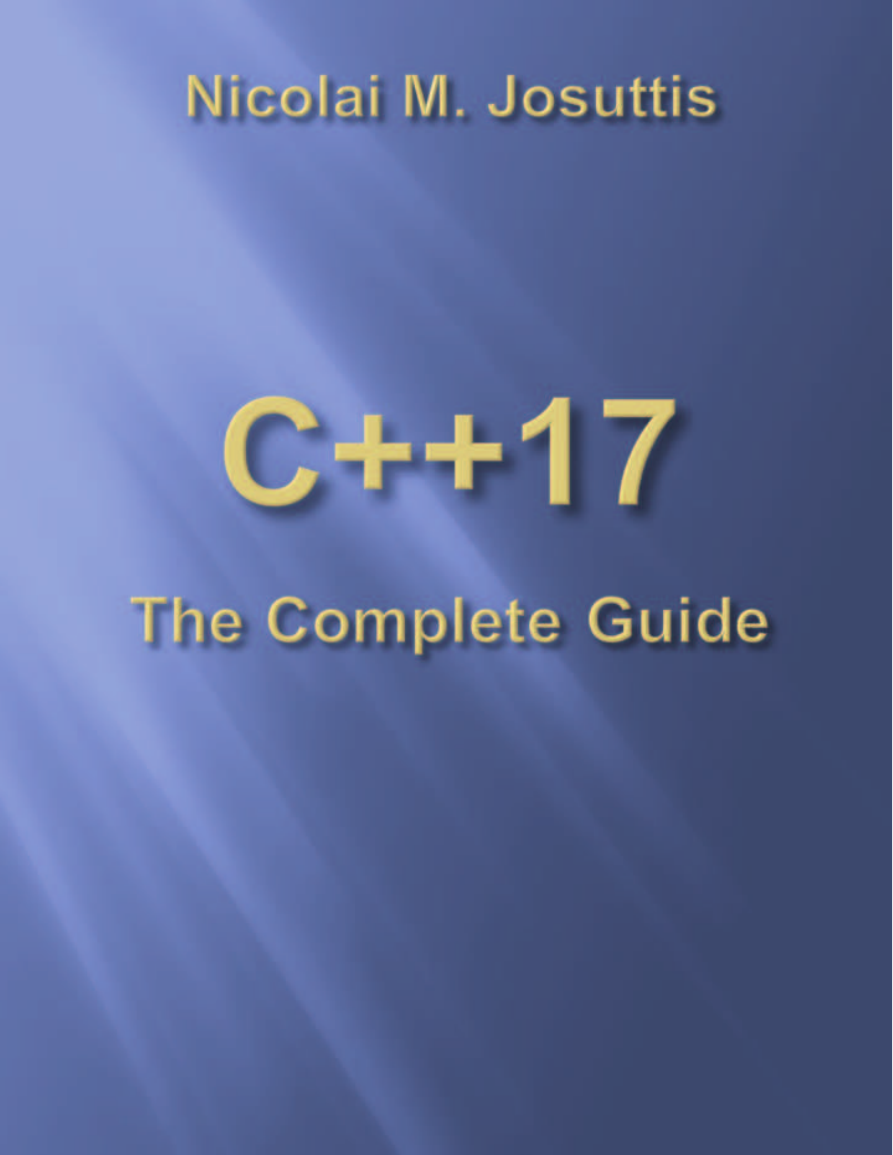

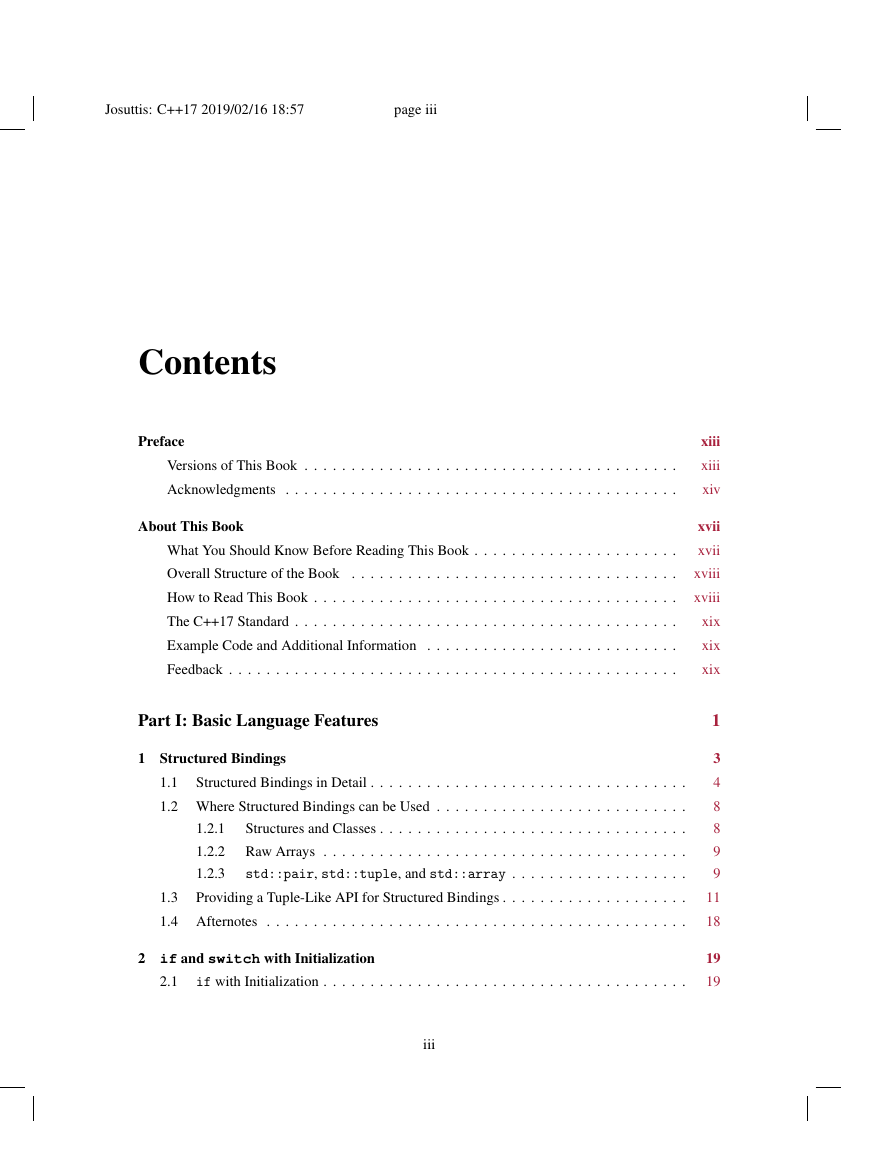

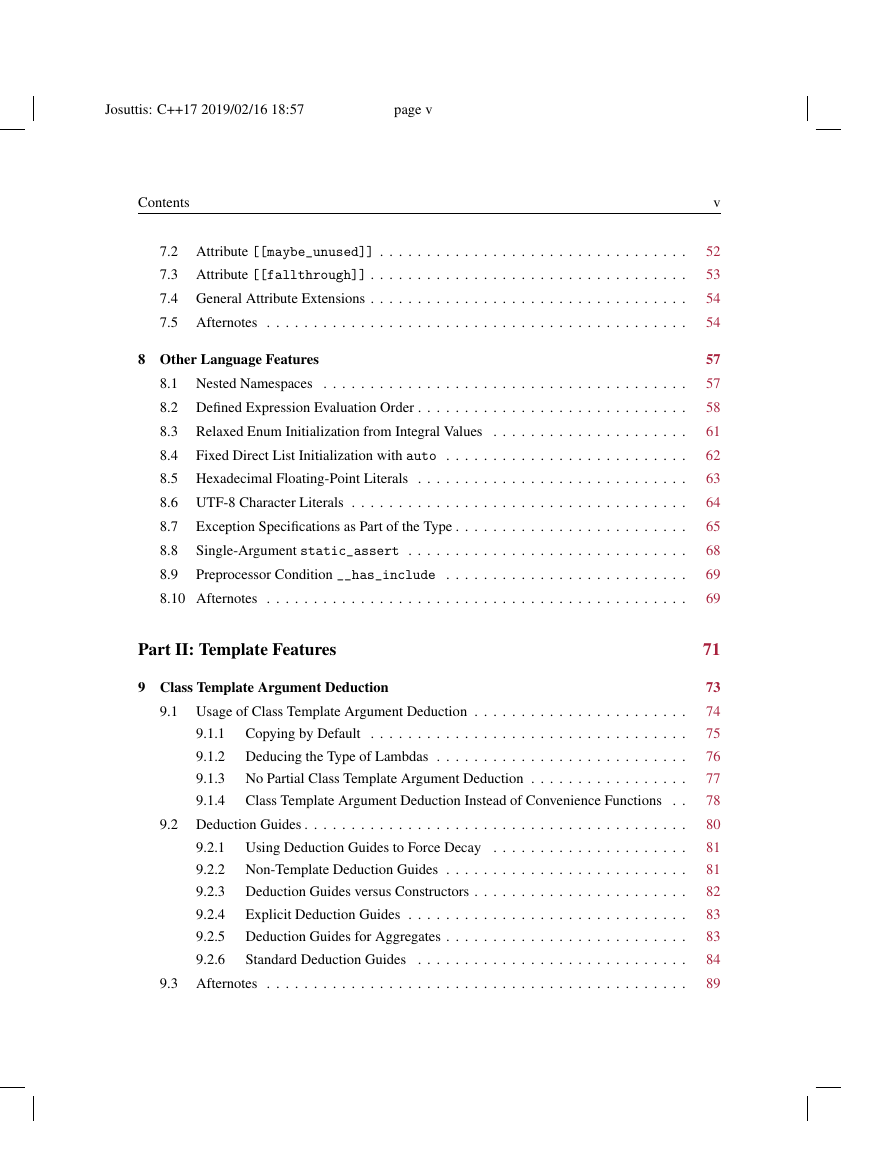

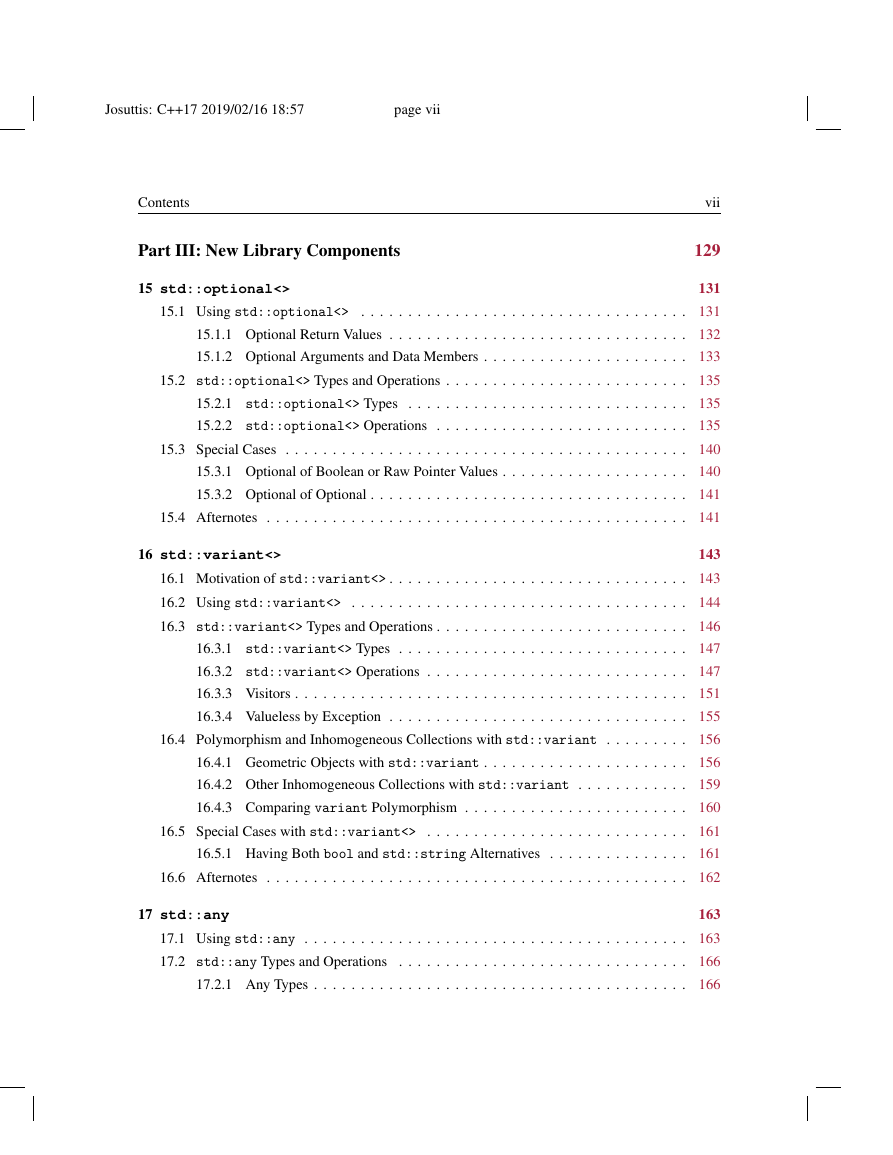
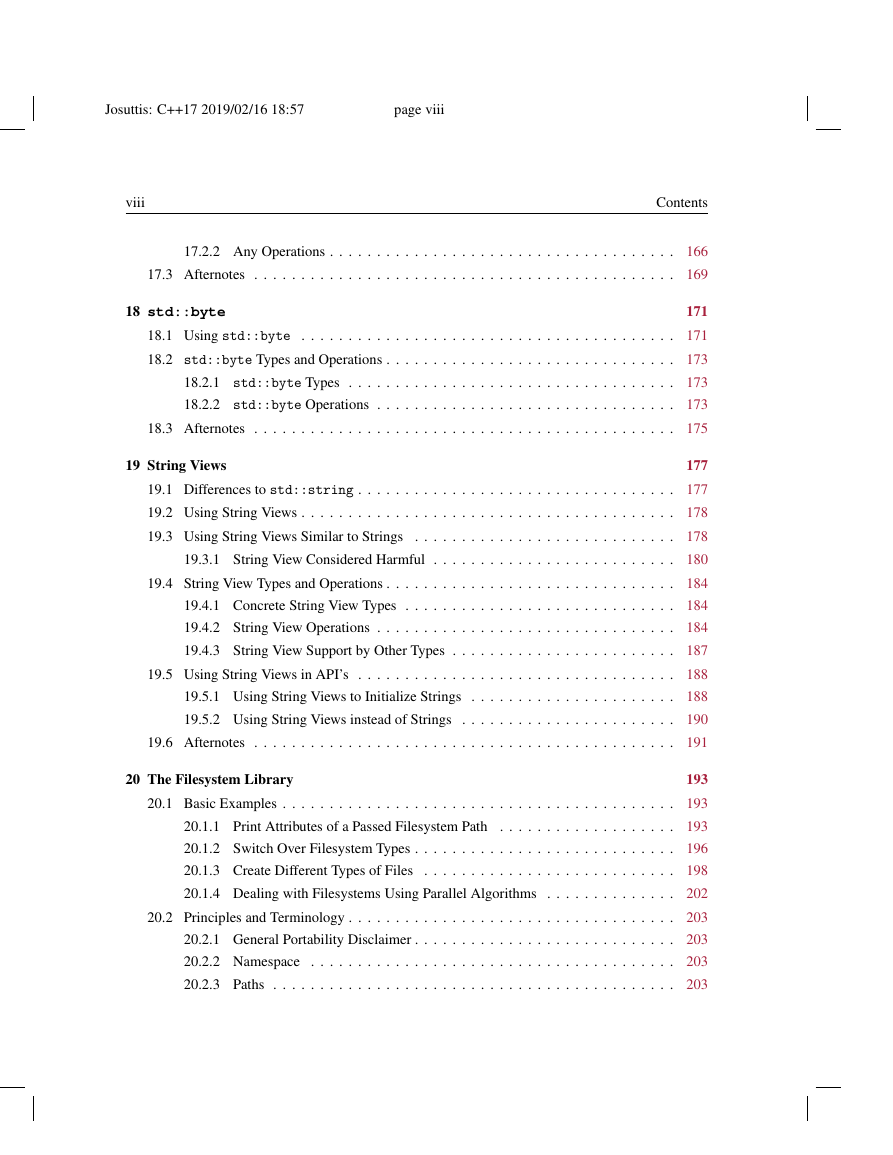








 2023年江西萍乡中考道德与法治真题及答案.doc
2023年江西萍乡中考道德与法治真题及答案.doc 2012年重庆南川中考生物真题及答案.doc
2012年重庆南川中考生物真题及答案.doc 2013年江西师范大学地理学综合及文艺理论基础考研真题.doc
2013年江西师范大学地理学综合及文艺理论基础考研真题.doc 2020年四川甘孜小升初语文真题及答案I卷.doc
2020年四川甘孜小升初语文真题及答案I卷.doc 2020年注册岩土工程师专业基础考试真题及答案.doc
2020年注册岩土工程师专业基础考试真题及答案.doc 2023-2024学年福建省厦门市九年级上学期数学月考试题及答案.doc
2023-2024学年福建省厦门市九年级上学期数学月考试题及答案.doc 2021-2022学年辽宁省沈阳市大东区九年级上学期语文期末试题及答案.doc
2021-2022学年辽宁省沈阳市大东区九年级上学期语文期末试题及答案.doc 2022-2023学年北京东城区初三第一学期物理期末试卷及答案.doc
2022-2023学年北京东城区初三第一学期物理期末试卷及答案.doc 2018上半年江西教师资格初中地理学科知识与教学能力真题及答案.doc
2018上半年江西教师资格初中地理学科知识与教学能力真题及答案.doc 2012年河北国家公务员申论考试真题及答案-省级.doc
2012年河北国家公务员申论考试真题及答案-省级.doc 2020-2021学年江苏省扬州市江都区邵樊片九年级上学期数学第一次质量检测试题及答案.doc
2020-2021学年江苏省扬州市江都区邵樊片九年级上学期数学第一次质量检测试题及答案.doc 2022下半年黑龙江教师资格证中学综合素质真题及答案.doc
2022下半年黑龙江教师资格证中学综合素质真题及答案.doc